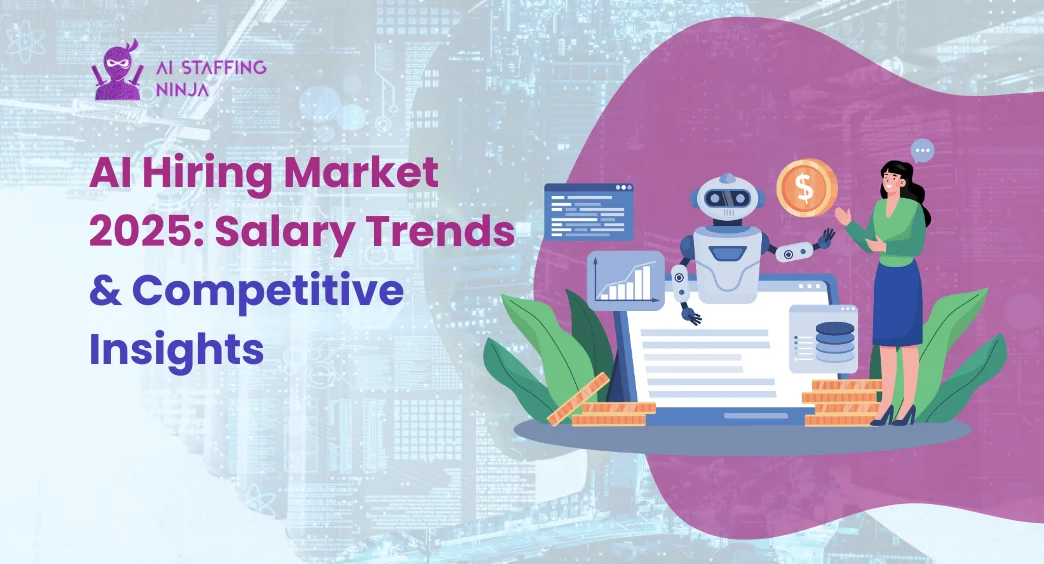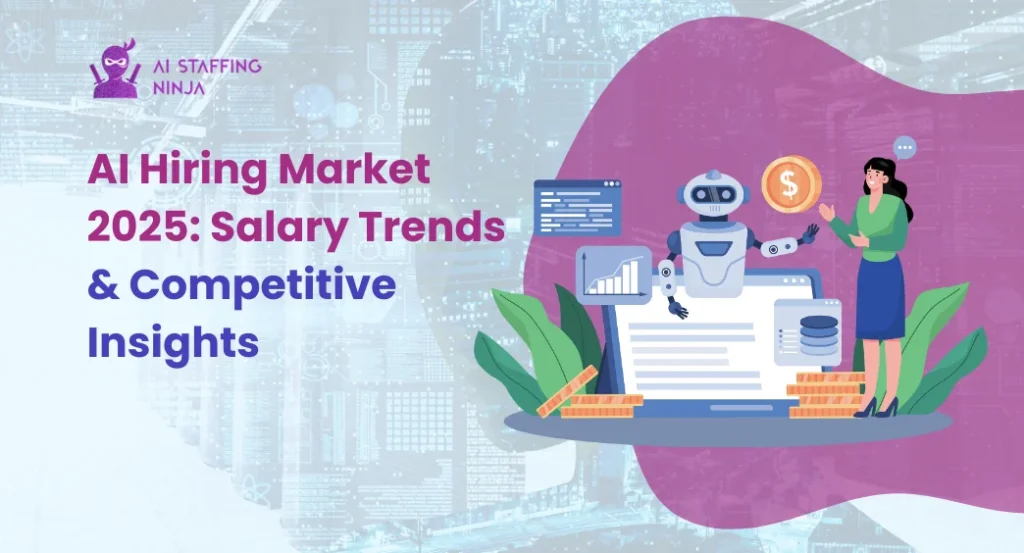
- By : By Staffing Ninja
AI Talent Salary Trends: What You Need to Know to Stay Competitive

The industrial revolution through Artificial Intelligence (AI) has generated new employment opportunities in different industrial sectors. Businesses worldwide are moving quickly to bring AI into operations which results in an explosive increase in demand for skilled workers. AI recruitment trends have experienced fierce competition which has pushed salaries to rise.
In order to attract and retain the best talents, companies must always stay informed on AI salary trends that range from AI engineers to machine learning experts and data scientists.
This article examines current salary standards together with compensation influencing elements while presenting optimal AI hiring methods for maintaining competitive advantage.
The Growing Demand for AI Talent
The AI job market is booming. Every sector including both healthcare and banking institutions and e-commerce businesses along with manufacturing plants employ artificial intelligence technology to improve operational efficiency. AI adoption has resulted in an extraordinary growth of AI job opportunities as job postings increased by 21% during the last year.
The market demands for AI specialists remains high yet the available talent pool is insufficient which makes AI professionals among the most highly requested workers today. Organizations that aim to succeed at AI talent recruitment need to provide competitive compensation packages according to AI hiring trends.
Current AI Salary Ranges
AI professional salaries depend on their job position and work experience together with their geographical location. The following data represents United States average salaries:
- AI Engineers – $135,000 to $2,05,292 per year
- Data Scientists – $125,000 to $190,000 per year
- Machine Learning Engineers – $128,000 to $190,000 per year
- AI Researchers – $1,30,000 to $200,000 per year
- Entry-Level AI Roles – $1,15,000 to $150,000 per year
The amounts paid to professionals in this field vary according to market needs and industrial developments and individual skill levels. The continuous development of AI hiring trends enables experts in specific AI domains to achieve elevated compensation levels.
What Affects AI Salaries?
Multiple elements determine the pay structure of AI engineers and other AI professionals as follows:
Experience & Skills: The salary of an AI professional increases substantially when they possess advanced skills in deep learning and NLP along with expertise in AI ethics.
Industry: The technology sector maintains its position as top payer but financial services and healthcare organizations together with retail are rapidly adopting AI recruitment trends.
- Location: AI hubs like San Francisco, New York, and Seattle pay the highest salaries, but remote work is equalizing the pay structure.
Company Size and Budget: Big tech companies such as Google and Amazon pay exorbitantly, while startups may pay comparatively less on salaries but compensate sufficiently with stock options.
Businesses need to understand these elements when they develop AI recruitment strategies to draw and maintain high-quality AI professionals.
New Trends in AI Compensation
AI has been changing rapidly and now interesting trends in compensation are affecting the job market:
- More Pay for Specialized Skills: Professionals skilled in areas like robotics, generative AI, or autonomous systems earn significantly more than engineers and other technical jobs.
- Equity and Bonuses Are Key: Most of the companies have moved towards offering stock options and performance-related bonuses in order to compete in the AI salary trends.
- Remote Work Adjustments: Salaries are being adjusted within companies to reflect the reality of remote work in AI hiring trends.
Businesses must track these shifts to maintain their lead position within AI recruitment trends.
How Companies Can Attract and Retain AI Talent
Attracting leading AI professionals demands more than salary competition alone. The following approach helps businesses achieve better AI hiring strategies:
- Organizations should review current AI salary trends to maintain their attractive compensation packages.
- Professional development opportunities should be provided to employees because it stands as a vital factor for keeping AI talent.
- The work environment must be flexible because AI professionals tend to choose between remote or hybrid work options.
- The creation of an innovative workplace culture will help organizations attract high-level AI specialists.
Organizations which expand their compensation approach to include career advancement and flexible work schedules will gain competitive advantage during AI talent recruitment.
Summing Up
The increasing need for AI specialists creates salary growth which requires businesses to track AI talent salary trends. Organizations need to adjust their hiring approaches along changing AI hiring patterns through competitive payment packages and growth potential combined with adaptable working arrangements.
Organizations which synchronize their AI talent acquisition strategies with industry developments will successfully draw and keep top performers for enduring business success.